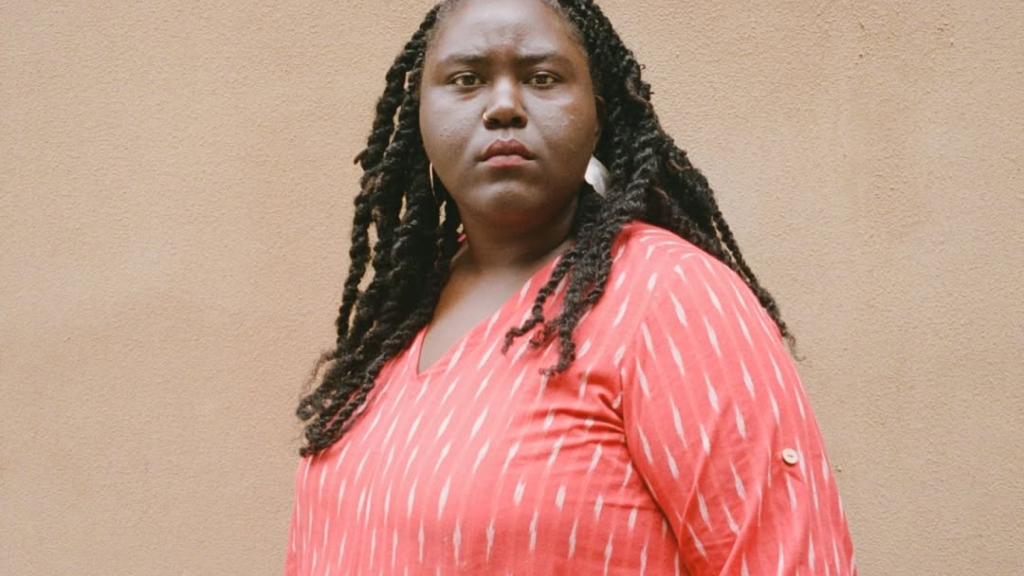What album would you say makes the perfect Black girl memoir? Would you name a project by SZA? Summer Walker? Maybe Megan thee Stallion? What would it cover? The hardships concerning love? Societal pressures? The need to fight all that seeks to destroy and control you while maintaining some poise? What if I told you the album that comes close to doing all of these is one that takes four parts to get through?
Palimpsesa, a project by Mal Devisa billed as a reintroduction after suffering severe health issues, traverses through the seemingly glass-coated heart of a free-spirited Black woman. For those introduced to Deja Carr through her breakout album, kiid, under the pen name Mal Devisa, Palimpsesa might feel like an extremely expanded version of that album. After all, four songs are the same. While kiid may be an introduction to Devisa at her most stylistically eclectic, Palimpsesta spreads that eclecticism across four sections. The first side contains her lo-fi hip-hop, the second transitions towards lo-fi R&B, the third finds her with a band or trusty bass swinging from genres like R&B to indie rock, and her fourth is more folky/jazzy. As tempting as it may be to separate the album by genre categorization, the real story of Palimpsesa is the way it is arranged, like peeling off the layers of a Black woman in the midst of constant American chaos. To kick things off, your best bet is not to expect instant softness going in.
On “You Are My Sunshine,” Carr positions herself in two spaces: as the everywoman in the struggle and someone who isn’t too ordinary to blow your talent out of the water any day. Not too ordinary to exude a queenly attitude when rapping—it wouldn’t be off if you hear a Queen Latifah influence in her style. One minute she’s just “out chasing the rent” after overcoming health issues, the next, she metaphorically “sunk your battleship” in a rap battle. One minute on the synth-heavy “Next Stop,” she recalls you “once knew her in school,” and the next, demands you “quit calling [her] famous.” This is a mere example of the Black female paradox. In a way, even as you may know her, you don’t know HER. As a free spirit who holds her feelings back for no soul, Carr also shares tales of performing in basements while not hesitating to question your punk cred on the same track. This isn’t the only space where duality plays a part, either.
Sound-wise, she tackles explosive lo-fi experimental rap on “Dominatrix,” 90s old school boom bap bang on “old intro,” and cloud rap on “New Eardrums.” Regardless of the style, the boom within her rap voice remains. You wouldn’t know if it was out of pure RUN DMC-like confidence or the seething anger of a hardcore punk record. Don’t think this album is all middle fingers to the sky, though. The full-throated ballad “Skyline Arms—Reach Out” is Carr’s most uplifting track, where she counts her most important blessings and reminds herself and you that “it’s not hard to reach out.” Such track is like looking at the woman of Palimpsesa’s first half and telling her she doesn’t have to be brave and boisterous all the time. She can be emotionally vulnerable. And so goes the tone for side three.
Side three is the part of the “memoir” where the walls slightly come down. It is the most raw and dark, yet no less confrontational. Here, two songs find Carr ruminating on mortality. On the circular and melancholic “To Be Unwilling,” Carr is with her bass, some drums, and a click track, laying down personal burdens, including a friend she had lost to death. Meanwhile, “Fire” is where Carr asks, “Does it kill you to know we’ll all die?” To balance this, she does bouncy funk on anti-police brutality protest track “Dangerous” and a bit of punk scuzz on the short “You Are What You Need.” It is almost like disc three is where the heart’s doors start to open, but not so much to destroy that tough wall of defiance.
The fourth and final part completely rips down the original lioness’ demeanor and reveals the gooey center of both Palimpsesa and the heart of Carr. She is either in love, in need of connection, or in need of true healing. “You Go to My Head” is a romantic jazz ballad yearning with the passion of plenty of suns before “My Potential” sings the fear of said romance. The closer “Forget That I” is a worthy epilogue, as the yearning for closeness and difficulty in getting out of her own way explains the sneerful demeanor of the first two sides. “I am more than what you think of me,” Carr stresses. “I fight fires in the dark.” Not an arsonist, just a passionate party looking for another to share her light.
Through twenty-nine tracks, Palimpsesa covers it all: the hunger to love, the need to fight, the frustration of being contained, the desire to be free, the deep-seated fear that can come with that, and the act of turning past insecurities into future assets. If you ask plenty of Black women, that is a real-life story. By arranging it like a slow and assuring confessional, Carr created a masterpiece.





